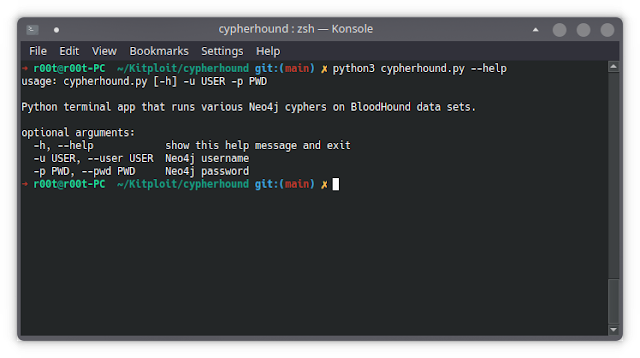A Python3 terminal application that contains 260+ Neo4j cyphers for BloodHound data sets.
Why?
BloodHound is a staple tool for every red teamer. However, there are some negative side effects based on its design. I will cover the biggest pain points I've experienced and what this tool aims to address:
- My tools think in lists - until my tools parse exported
JSONgraphs, I need graph results in a line-by-line format.txtfile - Copy/pasting graph results - this plays into the first but do we need to explain this one?
- Graphs can be too large to draw - the information contained in any graph can aid our goals as the attacker and we need to be able to view all data efficiently
- Manually running custom cyphers is time-consuming - let's automate it :)
This tool can also help blue teams to reveal detailed information about their Active Directory environments as well.
Features
Take back control of your BloodHound data with cypherhound!
- 264 cyphers as of date
- Set cyphers to search based on user input (user, group, and computer-specific)
- User-defined regex cyphers
- User-defined exporting of all results
- Default export will be just end object to be used as target list with tools
- Raw export option available in
grep/cut/awk-friendly format
Installation
Make sure to have python3 installed and run:
python3 -m pip install -r requirements.txt
Usage
Start the program with: python3 cypherhound.py -u <neo4j_username> -p <neo4j_password>
Commands
The full command menu is shown below:
Command Menu
set - used to set search parameters for cyphers, double/single quotes not required for any sub-commands
sub-commands
user - the user to use in user-specific cyphers (MUST include @domain.name)
group - the group to use in group-specific cyphers (MUST include @domain.name)
computer - the computer to use in computer-specific cyphers (SHOULD include .domain.name or @domain.name)
regex - the regex to use in regex-specific cyphers
example
set user [email protected]
set group domain [email protected]
set computer dc01.domain.local
set regex .*((?i)web).*
run - used to run cyphers
parameters
cypher number - the number of the cypher to run
example
run 7
export - used to export cypher results to txt files
parameters
cypher number - the number of the cypher to run and then export
output filename - the number of the output file, extension not needed
raw - write raw output or just end object (optional)
example
export 31 results
export 42 results2 raw
list - used to show a list of cyphers
parameters
list type - the type of cyphers to list (general, user, group, computer, regex, all)
example
list general
list user
list group
list computer
list regex
list all
q, quit, exit - used to exit the program
clear - used to clear the terminal
help, ? - used to display this help menuImportant Notes
- The program is configured to use the default
Neo4jdatabase andURI - Built for
BloodHound 4.2.0, certain edges will not work for previous versions Windowsusers must runpip3 install pyreadline3- Shortest paths exports are all the same (
rawor not) due to their unpredictable number of nodes
Future Goals
- Add cyphers for
Azureedges
Issues and Support
Please be descriptive with any issues you decide to open and if possible provide output (if applicable).


